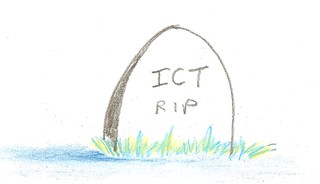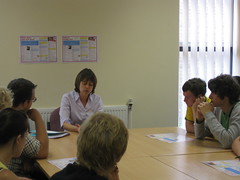Shock tactics
One of the hazards of teaching youngsters about educational technology -- well, any subject I suppose -- is that it's all too easy to become predictable.
What's a database for? Storing data. Yawn. What's a spreadsheet for? Modelling. Snooze. Yes, I know that we have to address such things -- indeed, would be failing in our obligations if we didn't -- but sometimes it does a lot of good to be a little 'left field' about it all, where possible.
Here are some ideas.
1. Look out for modern dress productions of Shakespeare
One of the best I've ever seen was a production of Julius Caesar. There were many fine moments in it, but the two which really stood out for me were the following:
In Act 1 Scene 2, Cassius says to Casca,
"Will you sup with me tonight, Casca?",
to which Casca replies,
"No, I am promised forth."
I the production I referred to, Casca didn't answer straight away. Instead, he reached into his pocket and pulled out a PDA, flipped it open, checked it for a few seconds, closed it, and put it away, and then said,
"No."
"I am promised forth."
Marvellous! Needless to say, the audience laughed its collective head off.
Later in the play, the action takes place in Mark Antony's camp. In this production, as the curtains draw apart we saw someone putting sheets of paper through a shredding machine. From an Eng Lit point of view this is wonderful, because it sows a few seeds of doubt in the audience's mind: what's being shredded, and why? Is Mark Anthony as squeaky clean as we were perhaps led to believe?
A very good film is Ian McKellan's Richard The Third, in which the first scene opens with a tickertape being transmitted. There's a discussion about technology in itself. If you teach modern history and you want to convey what Hitler's Germany was like, or a Citizenship teacher wanting to discuss ethics and loyalty, you could do a lot worse than show this film.
2. Bring old stories up to date
Similar to the first idea, this is all about getting the class to think about how modern technology would have been used by historical figures.
A good one I tried once was about Jesus. Instead of preaching the Sermon on the Mount, perhaps he'd have used YouTube. What difficulties might he have faced (a) getting his message across to as many people as possible, and (b) being believed?
Once you start to look at these things in a modern setting, the ideas, and even the language, seem less remote. In this way, focusing on modern technology can help to make subjects like history and Religious Education more comprehendible.
3. Look for alternative ways of presenting concepts
For example, I love this spreadsheet poem.
It's another way of getting the pupils to think about mathematical relationships. You could ask them to work out the relationships for themselves, before showing them the poem. You could devise a much simpler one, and then ask them to do the same.
4. Use technology to help you see things in different ways
I witnessed a very effective art lesson (for teachers) once, in which the tutor gave out digital cameras and instructed the teachers to go out and take pictures of textures. "Get right up close and personal", he told them. And they did: close-ups of brickwork and carpet tiles, to mention just two, were enough to stimulate discussion about texture, pattern, colours and shadows.
5. Use your imagination
Or rather, get the students to use theirs. How could a writer make use of a handheld camcorder, for example? Or, turning this idea on its head, what yet-to-be-invented gadget would be a real boon to an author?
You don't have to know the answers to such questions, because the important thing is the discussion and presentation which ensue.
6. Get reading

In the current issue of The Author, the Society of Author's magazine, there is an article about the use of historical fiction in the teaching of history:
"Rebecca Sullivan, CEO of the Historical Association, a charity that exists to promote and support the study and teaching of history at all levels, [said] 'Fiction can engage pupils and open them to more thought and study. Teachers use historical fiction because it improves historical understanding in pupils.'"
How much use of fiction do teachers of ICT use? There are some rich pickings, such as:
Asimov's Laws of Robotics
The dialogue between the astronaut and Hal, the all-powerful computer, in 2001: A Space Odyssey
The marvellous piece from Asimov, The Machine That Won the War
The Cold Equations by Tom Godwin
Flowers For Algernon, by Daniel Keys,
And last but not least, the brilliant news flash, 'Time travel is possible'
These stories can be great starting points for discussion, not only in the educational technology classroom, but for other subjects too.
7. Designing the classroom
Finally, a nice activity is a project in which pupils, working in groups, have to analyse the classroom and come up with ways in which it could be enhanced with technology. Part of that will have to include any refurbishments which may be necessary to accommodate the changes (such as a storage facility for a class set of mp3 recorders).
Needless to say, groups should present their findings and ideas to the rest of the class and even, if there's a particularly mouth-watering idea, to the Principal.
The thing that all of these ideas have in common is that they stray from the 'norm', and that gives them a bit of a punch.
What 'outside the box' ideas have you used to teach technology, or with technology?
If you enjoyed reading this article, you will probably find this one useful too:
More Shock Tactics: Making ICT More Exciting
 Teaching can be a lonely profession, especially if, as is often the case, you are the sole teacher of ICT or Computing in your school. Whether you’re on your own or part of a team, I’d thoroughly recommend joining a community or several. Why?
Teaching can be a lonely profession, especially if, as is often the case, you are the sole teacher of ICT or Computing in your school. Whether you’re on your own or part of a team, I’d thoroughly recommend joining a community or several. Why? Teaching can be a lonely profession, especially if, as is often the case, you are the sole teacher of ICT or Computing in your school. Whether you’re on your own or part of a team, I’d thoroughly recommend joining a community or several. Why?
Teaching can be a lonely profession, especially if, as is often the case, you are the sole teacher of ICT or Computing in your school. Whether you’re on your own or part of a team, I’d thoroughly recommend joining a community or several. Why?











